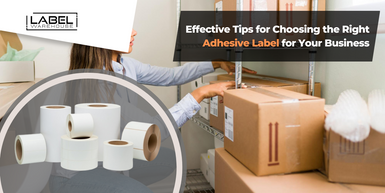Posted by Label Warehouse on 20th Feb 2024
How to Choose the Right Adhesive Label for Your Business – Best Tips & Guide
In today’s competitive landscape of business, the significance of first impressions cannot be overstated. Crafting a positive and lasting impression is essential, and one of the most influential avenues for achieving this is through strategic branding. Adhesive labels emerge as pivotal players in this process, serving a dual purpose by not only conveying essential information but also enhancing the overall visual appeal of your products. The careful selection of the right adhesive label for your business is a decision that demands thoughtful consideration. It involves a nuanced understanding of your product, its environmental exposure, and the specific requirements of your branding strategy. As these labels become the face of your products, choosing wisely ensures not only the effective communication of vital details but also contributes significantly to the overall aesthetic cohesion of your brand. In essence, the process of selecting the right adhesive label is a strategic investment that pays dividends in creating a favourable and memorable impression within the competitive business landscape.
In this blog, we have enlisted some effective tips to help you make the best choice for your branding needs.
Let’s get started!
What Are Adhesive Labels? – A Complete Overview
Adhesive labels are versatile and self-adhering materials commonly used in various industries for product identification, branding, and information display. Comprising a facestock (the visible material), adhesive, and a liner (protective backing), adhesive labels adhere to surfaces when pressure is applied, creating a bond that is both secure and temporary or permanent, depending on the adhesive type. These labels can be made from different materials, such as paper, vinyl, polyester, or polypropylene, each offering distinct characteristics suited to specific applications. Adhesive labels play a pivotal role in conveying essential information about a product, including its name, ingredients, usage instructions, and branding elements. They are instrumental in creating a visual identity for products and businesses, contributing to the overall aesthetics and marketability of a wide range of items. From product packaging to promotional materials, adhesive labels serve as an integral component in effective communication and brand representation within the commercial landscape.
Which Businesses Need Adhesive Labels? – Key Industries Explained
Various types of businesses rely on adhesive labels as essential tools for product identification, branding, and information dissemination. Industries such as food and beverage heavily utilise adhesive labels for packaging and nutritional information. Cosmetics and personal care product manufacturers use labels to showcase brand identity and list ingredients. In the pharmaceutical and healthcare sectors, adhesive labels are crucial for labelling medications and medical equipment. Retail and consumer goods, including clothing, electronics, and home goods, benefit from adhesive labels for product identification. Manufacturing and industrial businesses use labels on machinery and automotive parts, while logistics and shipping industries rely on labels for tracking and identification. Electronics and technology companies use labels for product information, and the automotive industry employs labels for warning and safety information. From chemical containers to hazardous material labels, the chemical industry utilises adhesive labels for safety and compliance. The wine and spirits industry prominently features labels on bottles for branding and product information. eCommerce and online retail sectors utilise labels for shipping and product identification. These examples highlight the diverse range of businesses and industries that require adhesive labels for various purposes, emphasising the universal importance of these labels in modern commerce.
Types of Adhesive Labels & Their Uses
Adhesive labels come in various types, each tailored to specific applications and environmental conditions. Understanding the different types of adhesive labels allows businesses to choose the most suitable option for their particular needs.
Paper Labels
- Description: Paper labels are cost-effective and commonly used for a wide range of applications. They are suitable for products that won't be exposed to moisture or harsh conditions.
- Best Suited For: Indoor use, dry environments, and applications where affordability is a key consideration.
Vinyl Labels
- Description: Vinyl labels are durable and resistant to moisture, making them ideal for products stored in damp conditions. They are also known for their flexibility and ability to conform to various surfaces.
- Best Suited For: Outdoor use, products exposed to moisture, curved or uneven surfaces.
Polyester Labels
- Description: Polyester labels are known for their durability and resistance to tearing and chemicals. They are suitable for products that may undergo rough handling or challenging environmental conditions.
- Best Suited For: Industrial and manufacturing environments, chemical-resistant applications.
Polypropylene Labels
- Description: Polypropylene labels are resistant to water, oil, and chemicals. They are known for their clarity and are commonly used for products requiring a high-quality, transparent label.
- Best Suited For: Clear and transparent labelling, products exposed to oil or chemicals.
Removable Labels
- Description: These labels are designed to be easily removed without leaving residue. They are suitable for temporary labelling or products that may need repositioning.
- Best Suited For: Products with changing information, promotional materials, and temporary labelling.
Tamper-Evident Labels
- Description: Tamper-evident labels are designed to show visible signs of tampering, providing a security feature for products that require protection from unauthorised access.
- Best Suited For: Pharmaceuticals, food packaging, sensitive or valuable products.
High-Temperature Labels
- Description: These labels are designed to withstand high temperatures without losing adhesion or readability. They are crucial for products subjected to heat during manufacturing or use.
- Best Suited For: Industrial applications, electronic components, automotive parts.
Freezer-Grade Labels
- Description: Labels designed to withstand extremely low temperatures without becoming brittle or losing adhesive properties. Ideal for products stored in freezers or cold storage.
- Best Suited For: Food packaging, medical storage, frozen products.
Top Benefits of Using Adhesive Labels for Your Business
Utilising adhesive labels for your business offers a myriad of advantages that extend beyond basic product identification. These versatile labels contribute significantly to branding, marketing, and overall operational efficiency.
- Brand Visibility and Recognition: Adhesive labels serve as a prominent visual representation of your brand on products and packaging. This visibility enhances brand recognition, making it easier for consumers to identify and remember your products in a crowded market.
- Information Conveyance: Adhesive labels provide a platform to convey essential information about your products, including ingredients, usage instructions, safety guidelines, and compliance details. Clear and well-designed labels enhance customer understanding and satisfaction.
- Customisation and Branding Opportunities: The flexibility of adhesive labels allows for customisation, enabling businesses to create unique designs that align with their brand identity. This customisation extends to colour, logo placement, and overall aesthetics, fostering a cohesive and memorable brand image.
- Cost-Effectiveness: Adhesive labels are a cost-effective solution for branding and product labelling. Compared to alternative methods like direct printing on packaging, labels offer a more economical way to achieve professional and visually appealing results.
- Versatility in Application: Adhesive labels can adhere to various surfaces, making them versatile for application on different types of products and materials. Whether used on glass, plastic, metal, or paper, adhesive labels provide a consistent and adaptable solution.
- Promotional Capabilities: Businesses can leverage adhesive labels for promotional purposes by incorporating QR codes, promotional messages, or limited-time offers. This allows for dynamic and interactive marketing strategies directly on the product packaging.
- Time Efficiency and Convenience: The application of adhesive labels is a quick and efficient process, allowing businesses to streamline labelling operations. This efficiency is particularly valuable in high-volume production environments, contributing to overall operational convenience.
- Regulatory Compliance: Adhesive labels play a crucial role in meeting regulatory requirements by providing a platform for displaying mandated information, such as nutritional facts, safety warnings, and compliance symbols. This ensures that products adhere to industry standards and regulations.
- Tamper-Evident and Security Features: Certain adhesive labels can be designed with tamper-evident features, adding an extra layer of security to products. This is particularly valuable in industries where consumer safety and product integrity are paramount.
- Durability and Resistance: Depending on the chosen material, adhesive labels can offer durability and resistance to various environmental factors, such as moisture, heat, chemicals, or UV exposure. This ensures that labels remain intact and legible throughout the product's lifecycle.
Choosing the Right Adhesive Label – Step-by-Step Guide
Selecting the right adhesive label for your business involves a thoughtful process that considers various factors to ensure the labels effectively meet your specific needs.
- Understand Your Product: Begin by thoroughly understanding the nature of your product. Consider factors such as the type of material, size, shape, and the environment in which it will be used or stored. Different products may have distinct labelling requirements based on these characteristics.
- Evaluate Environmental Conditions: Assess the environmental conditions your product will face, including temperature variations, humidity, and exposure to chemicals or moisture. This information helps determine the type of label material and adhesive that will withstand these conditions.
- Define the Label's Purpose: Clearly define the purpose of the label. Whether it's for branding, providing essential information, or serving a functional purpose, understanding the primary goal of the label helps in making design and material choices that align with your objectives.
- Choose the Right Material: Select a label material that suits the characteristics of your product and its environment. Common materials include paper, vinyl, polyester, and polypropylene. Paper labels may be suitable for dry environments, while vinyl or polyester labels offer durability and moisture resistance.
- Consider Adhesive Properties: The adhesive is a critical component. Choose an adhesive that adheres well to your product's surface and meets your application needs. Permanent adhesives are suitable for products that won't be opened and resealed, while removable adhesives are ideal for items that may need repositioning.
- Prioritise Design and Aesthetics: The design of your label is crucial for brand visibility. Consider colour schemes, font styles, and graphic elements that align with your brand identity. Ensure that the label design enhances the overall visual appeal of your product.
- Test in Real Conditions: Before finalising your choice, conduct real-world tests of the selected label. This step allows you to evaluate the label's performance, durability, and adherence under actual usage conditions. Testing ensures that the chosen label meets your expectations and performs well in the intended environment.
- Consider Compliance and Regulations: Be aware of any industry or regulatory requirements for labelling. Ensure that your chosen label design and information display comply with relevant standards, including nutritional information, safety warnings, and other mandated details.
- Evaluate Budget Considerations: Consider your budget constraints while choosing adhesive labels. Different materials and printing options may vary in cost, so weigh the benefits against the budget to make a cost-effective choice without compromising quality.
- Consult with Labelling Experts: If in doubt, seek advice from labelling experts or suppliers. They can provide valuable insights into the best materials, adhesives, and printing techniques based on your specific requirements and industry standards.
Wrapping Up,
Choosing the right adhesive label for your business is a decision that requires careful consideration of various factors. By understanding your product, considering label materials, defining the label's purpose, choosing the right adhesive, prioritising design, and conducting real-world tests, you can ensure that your adhesive labels not only enhance your product's appearance but also effectively convey your brand message to your target audience.
If you are browsing the internet for quality adhesive labels at exciting prices for your business requirements, look no further! Browse through our expansive inventory at Label Warehouse and shop today!

